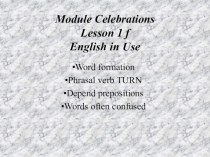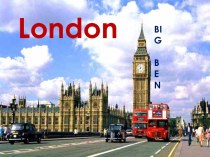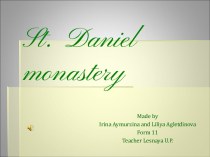- Главная
- Разное
- Бизнес и предпринимательство
- Образование
- Развлечения
- Государство
- Спорт
- Графика
- Культурология
- Еда и кулинария
- Лингвистика
- Религиоведение
- Черчение
- Физкультура
- ИЗО
- Психология
- Социология
- Английский язык
- Астрономия
- Алгебра
- Биология
- География
- Геометрия
- Детские презентации
- Информатика
- История
- Литература
- Маркетинг
- Математика
- Медицина
- Менеджмент
- Музыка
- МХК
- Немецкий язык
- ОБЖ
- Обществознание
- Окружающий мир
- Педагогика
- Русский язык
- Технология
- Физика
- Философия
- Химия
- Шаблоны, картинки для презентаций
- Экология
- Экономика
- Юриспруденция
Что такое findslide.org?
FindSlide.org - это сайт презентаций, докладов, шаблонов в формате PowerPoint.
Обратная связь
Email: Нажмите что бы посмотреть
Презентация на тему по английскому языку на тему DANIEL DEFOE
Содержание
- 2. Daniel DefoeBorn 1659–1660London, EnglandDied 24 April 1731 (aged 70-72)London, EnglandOccupation Writer, journalist, merchantGenres Adventure
- 3. Daniel Defoe (1660 – 24 April 1731),
- 4. Daniel DefoeHe lived and worked in The
- 5. Daniel Defoe was born in London, his
- 6. Defoe's first important publication was An Essay
- 7. An ill-timed satire early in Queen Anne's
- 8. Daniel Defoe was nearly sixty when he
- 9. Life and Strange Surprising Adventures of RobinsonRobinson
- 10. Life and Strange Surprising Adventures of RobinsonDefoe’s
- 11. Life and Strange Surprising Adventures of RobinsonIn
- 12. Life and Strange Surprising Adventures of RobinsonThe
- 13. The glossary
- 14. The glossary
- 15. WorksDefoe's next novel was Captain Singleton (1720)Later,
- 16. DeathDaniel Defoe died on 24 April 1731,
- 17. Sourceshttp://en.wikipedia.org/wiki/Daniel_Defoehttp://www.online-literature.com/defoe/crusoe/http://en.wikipedia.org/wiki/Robinson_Crusoe_Islandhttp://www.shmoop.com/robinson-crusoe/friday.htmlhttp://www.enotes.com/topics/robinson-crusoe
- 18. Скачать презентацию
- 19. Похожие презентации
Daniel DefoeBorn 1659–1660London, EnglandDied 24 April 1731 (aged 70-72)London, EnglandOccupation Writer, journalist, merchantGenres Adventure

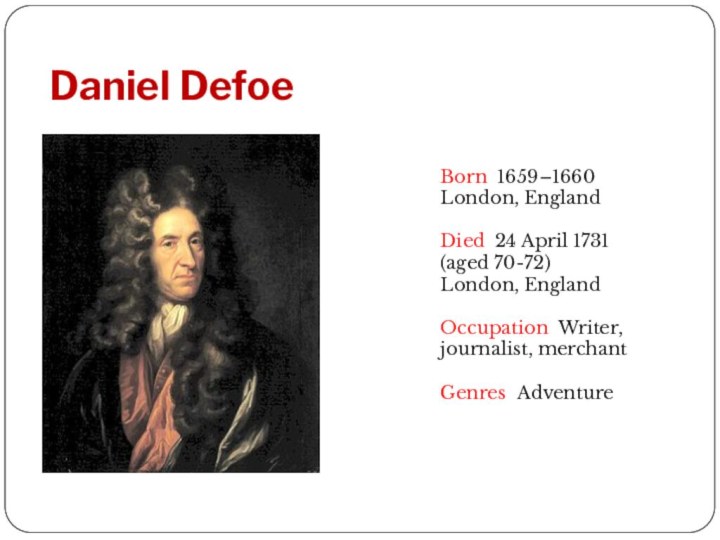
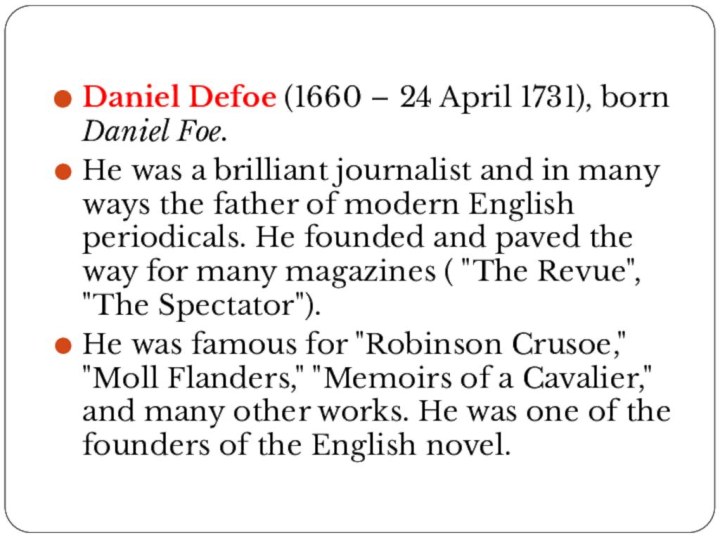

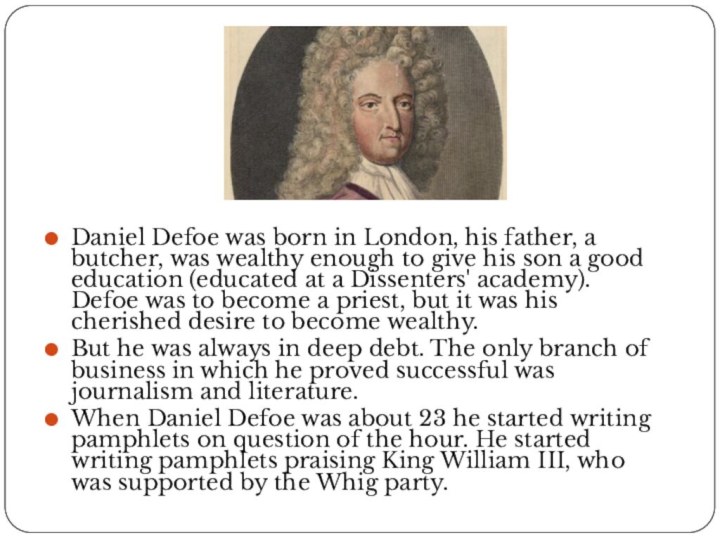
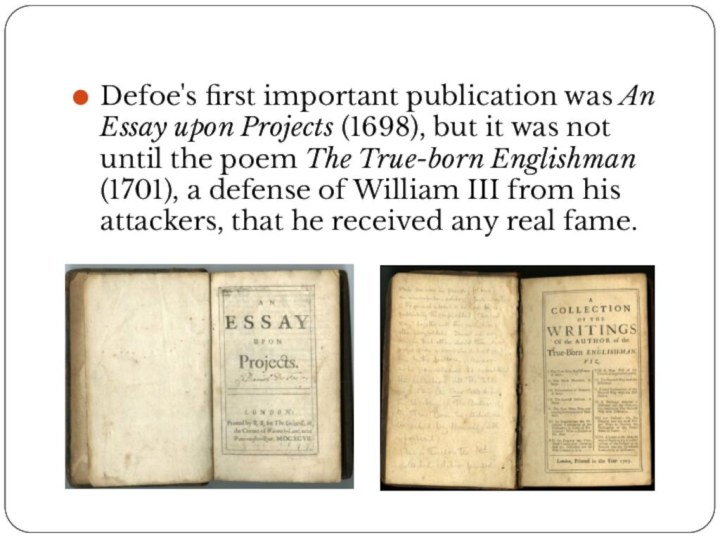
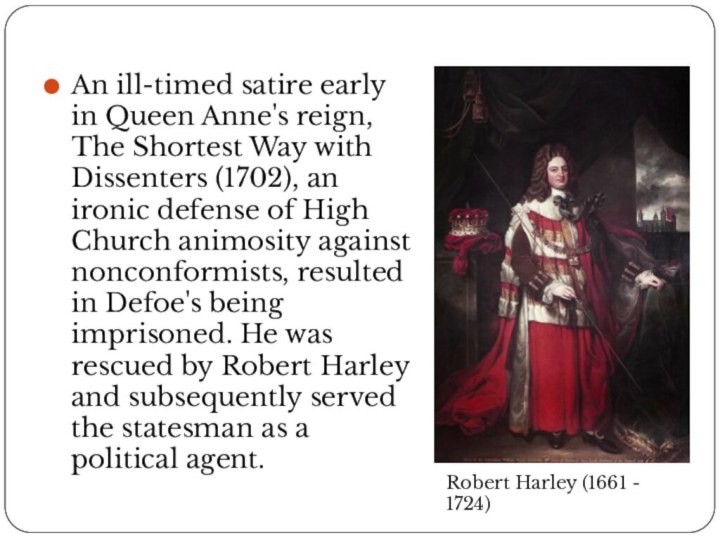
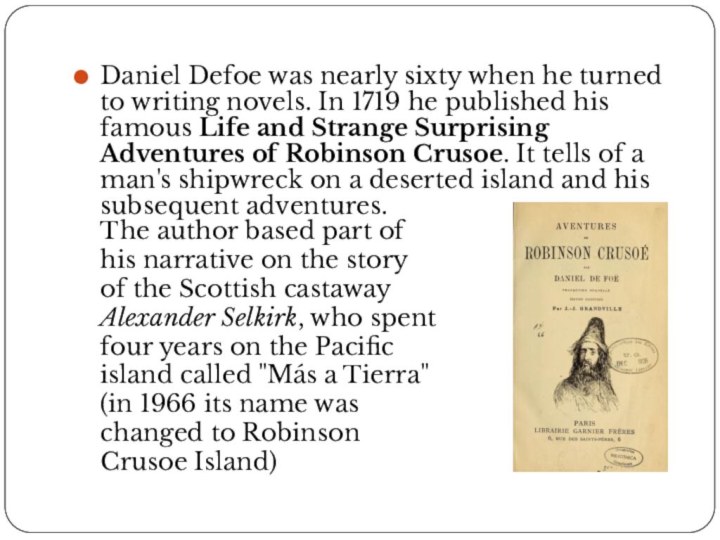
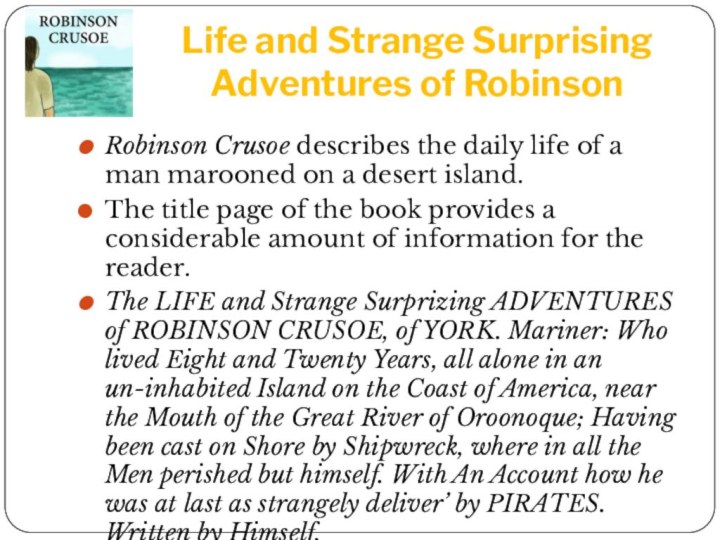
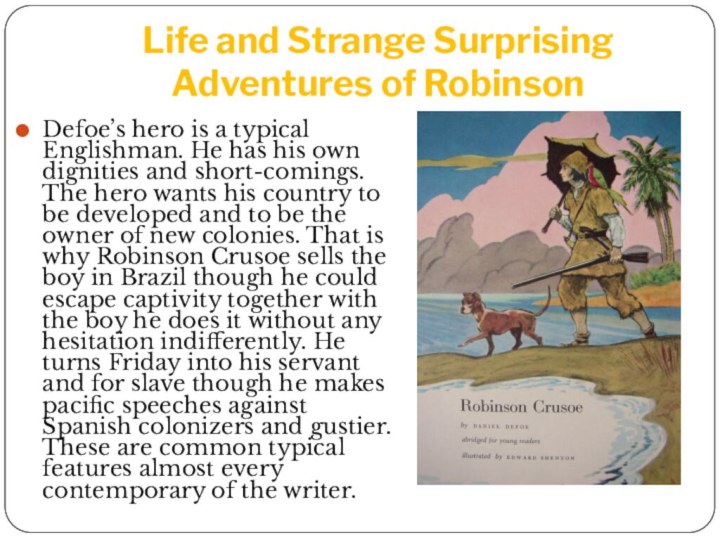
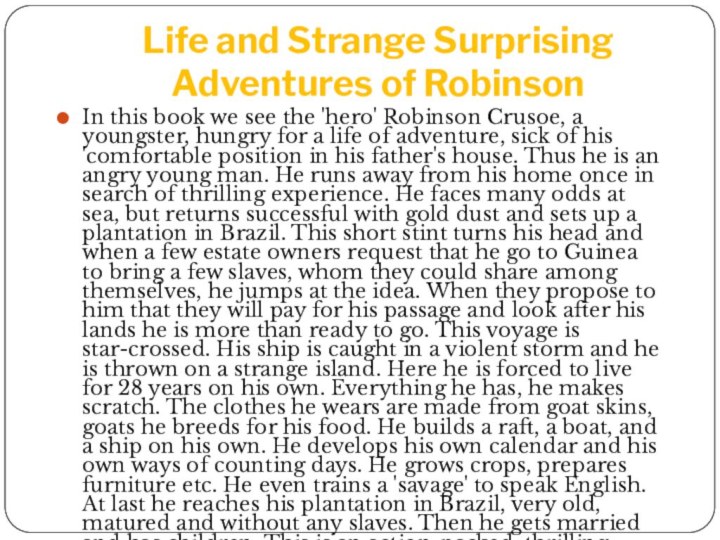
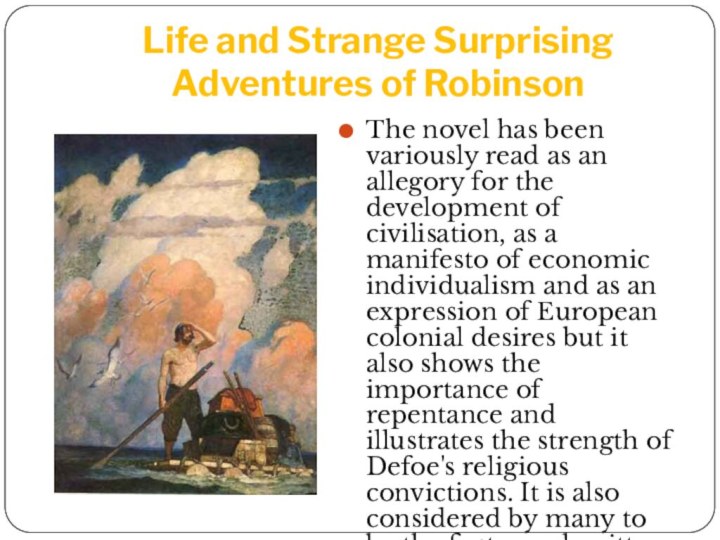
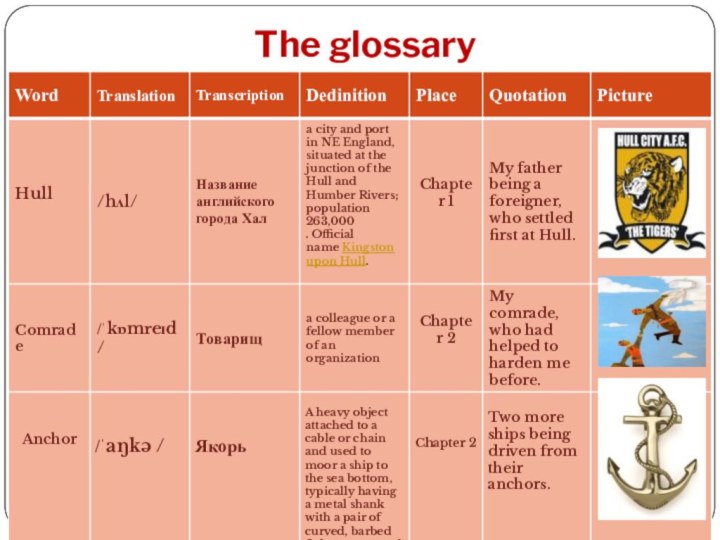
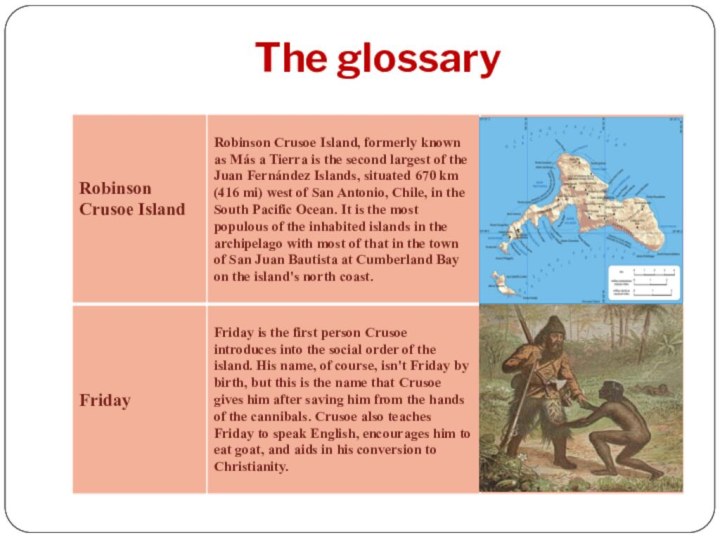
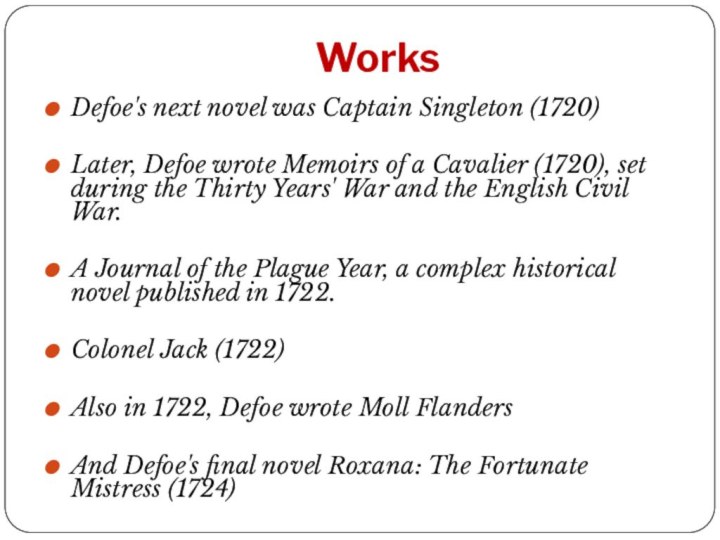
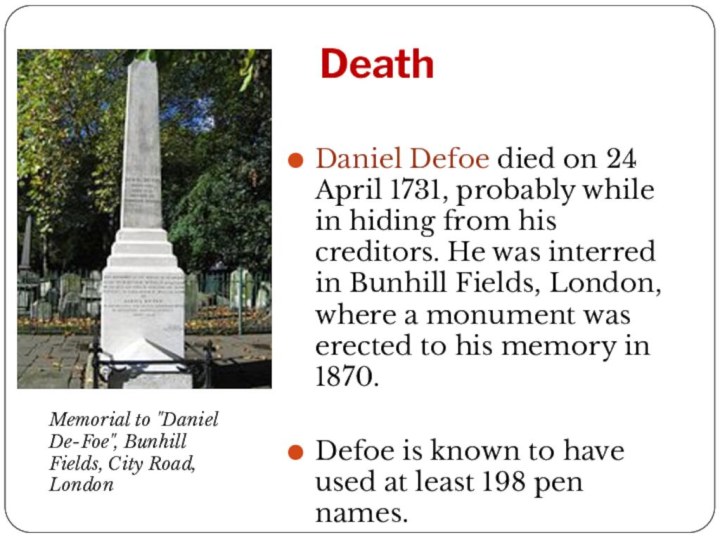
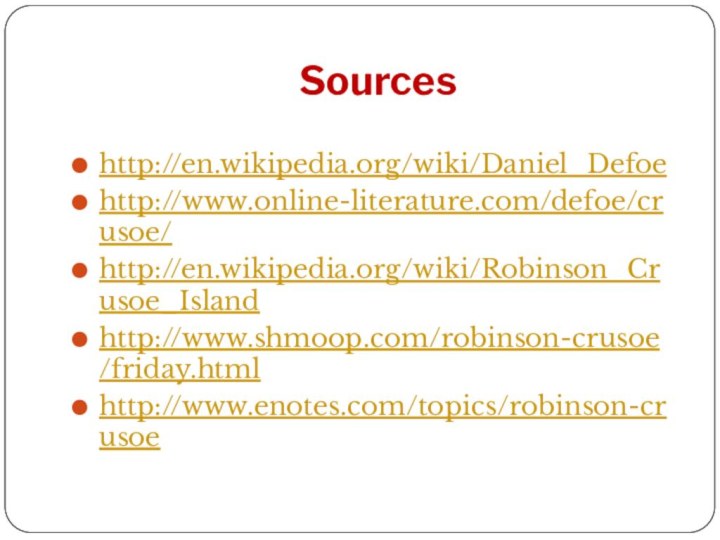

Слайд 3 Daniel Defoe (1660 – 24 April 1731), born
Daniel Foe.
He was a brilliant journalist and in many
ways the father of modern English periodicals. He founded and paved the way for many magazines ( "The Revue", "The Spectator").He was famous for "Robinson Crusoe," "Moll Flanders," "Memoirs of a Cavalier," and many other works. He was one of the founders of the English novel.
Слайд 4
Daniel Defoe
He lived and worked in The Age
of Enlightenment (or simply Age of Reason) was a
cultural movement of intellectuals beginning in late 17th-century Europe emphasizing reason and individualism rather than tradition.Its purpose was to reform society using reason, to challenge ideas grounded in tradition and faith, and to advance knowledge through the scientific method. It promoted scientific thought, skepticism, and intellectual interchange. The Enlightenment was a revolution in human thought. This new way of thinking was that rational thought begins with clearly stated principles, uses correct logic to arrive at conclusions, tests the conclusions against evidence, and then revises the principles in the light of the evidence.
Слайд 5 Daniel Defoe was born in London, his father,
a butcher, was wealthy enough to give his son
a good education (educated at a Dissenters' academy). Defoe was to become a priest, but it was his cherished desire to become wealthy.But he was always in deep debt. The only branch of business in which he proved successful was journalism and literature.
When Daniel Defoe was about 23 he started writing pamphlets on question of the hour. He started writing pamphlets praising King William III, who was supported by the Whig party.
Слайд 6 Defoe's first important publication was An Essay upon
Projects (1698), but it was not until the poem
The True-born Englishman (1701), a defense of William III from his attackers, that he received any real fame.Слайд 7 An ill-timed satire early in Queen Anne's reign,
The Shortest Way with Dissenters (1702), an ironic defense
of High Church animosity against nonconformists, resulted in Defoe's being imprisoned. He was rescued by Robert Harley and subsequently served the statesman as a political agent.Robert Harley (1661 - 1724)
Слайд 8 Daniel Defoe was nearly sixty when he turned
to writing novels. In 1719 he published his famous
Life and Strange Surprising Adventures of Robinson Crusoe. It tells of a man's shipwreck on a deserted island and his subsequent adventures.The author based part of his narrative on the story of the Scottish castaway Alexander Selkirk, who spent four years on the Pacific island called "Más a Tierra" (in 1966 its name was changed to Robinson Crusoe Island)
Слайд 9
Life and Strange Surprising Adventures of Robinson
Robinson Crusoe
describes the daily life of a man marooned on
a desert island.The title page of the book provides a considerable amount of information for the reader.
The LIFE and Strange Surprizing ADVENTURES of ROBINSON CRUSOE, of YORK. Mariner: Who lived Eight and Twenty Years, all alone in an un-inhabited Island on the Coast of America, near the Mouth of the Great River of Oroonoque; Having been cast on Shore by Shipwreck, where in all the Men perished but himself. With An Account how he was at last as strangely deliver’ by PIRATES. Written by Himself.
Слайд 10
Life and Strange Surprising Adventures of Robinson
Defoe’s hero
is a typical Englishman. He has his own dignities
and short-comings. The hero wants his country to be developed and to be the owner of new colonies. That is why Robinson Crusoe sells the boy in Brazil though he could escape captivity together with the boy he does it without any hesitation indifferently. He turns Friday into his servant and for slave though he makes pacific speeches against Spanish colonizers and gustier. These are common typical features almost every contemporary of the writer.
Слайд 11
Life and Strange Surprising Adventures of Robinson
In this
book we see the 'hero' Robinson Crusoe, a youngster,
hungry for a life of adventure, sick of his 'comfortable position in his father's house. Thus he is an angry young man. He runs away from his home once in search of thrilling experience. He faces many odds at sea, but returns successful with gold dust and sets up a plantation in Brazil. This short stint turns his head and when a few estate owners request that he go to Guinea to bring a few slaves, whom they could share among themselves, he jumps at the idea. When they propose to him that they will pay for his passage and look after his lands he is more than ready to go. This voyage is star-crossed. His ship is caught in a violent storm and he is thrown on a strange island. Here he is forced to live for 28 years on his own. Everything he has, he makes scratch. The clothes he wears are made from goat skins, goats he breeds for his food. He builds a raft, a boat, and a ship on his own. He develops his own calendar and his own ways of counting days. He grows crops, prepares furniture etc. He even trains a 'savage' to speak English. At last he reaches his plantation in Brazil, very old, matured and without any slaves. Then he gets married and has children. This is an action-packed, thrilling story.
Слайд 12
Life and Strange Surprising Adventures of Robinson
The novel
has been variously read as an allegory for the
development of civilisation, as a manifesto of economic individualism and as an expression of European colonial desires but it also shows the importance of repentance and illustrates the strength of Defoe's religious convictions. It is also considered by many to be the first novel written in English.
Слайд 15
Works
Defoe's next novel was Captain Singleton (1720)
Later, Defoe
wrote Memoirs of a Cavalier (1720), set during the
Thirty Years' War and the English Civil War.A Journal of the Plague Year, a complex historical novel published in 1722.
Colonel Jack (1722)
Also in 1722, Defoe wrote Moll Flanders
And Defoe's final novel Roxana: The Fortunate Mistress (1724)
Слайд 16
Death
Daniel Defoe died on 24 April 1731, probably
while in hiding from his creditors. He was interred
in Bunhill Fields, London, where a monument was erected to his memory in 1870.Defoe is known to have used at least 198 pen names.
Memorial to "Daniel De-Foe", Bunhill Fields, City Road, London
